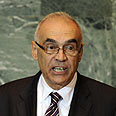

The United States on Wednesday sought to press its wary allies in Egypt's army leadership to bolster ties with Israel and stick to scheduled elections later this year, even though a new set of leaders much less friendly to the US and the Jewish state may be the winners.
Ahead of a meeting between Secretary of State Hillary Clinton and Egyptian Foreign Minister Muhammed Amr, the State Department said it was encouraged by the way Egypt's military council has defused tensions with its neighbor after protesters recently stormed the Israeli embassy in Cairo.
Related stories:
- Israel mulls alternative locations for embassy in Cairo
- Egyptian FM to UN: Israel's acts criminal
- Egypt Air removes Israel from map
But State officials expressed continued concerns over the interim government's commitment to ending the emergency laws that were a mainstay of abuse during Hosni Mubarak's three-decade rule.
"It is obviously a very important time in Egypt," spokeswoman Victoria Nuland told reporters. "We have a broad and deep relationship working to support the democratic transition in Egypt that is under way."
The American demands on Egypt represent in some ways the twin set of hopes and fears for all the movements for greater democracy in the Arab world.
Precarious balancing act
With Egypt, the United States is facing a precarious balancing act: It is trying to lay the foundation for renewed relations with a future government that will be more democratic if less amenable to US interests; and it is attempting to convince Egypt's leaders to salvage ties with Israel and maintain counterterrorism and diplomatic efforts that may be deemed vital for American national security, but not necessarily supported by the Egyptian people.
The fraying of relations with Israel has especially concerned the United States, which has been lobbying much of the world in recent weeks against a Palestinian bid for UN membership. Egypt, which under Mubarak often played a key mediation role between the two sides, has come out determinedly for the Palestinian bid over fierce Israeli opposition.
And with elections around the corner, Washington's challenge is only likely to get more difficult. At stake is American influence in a crucial geopolitical space linking North Africa to the Arabian Peninsula. Also in question is how the US projects power in a part of the world where al-Qaeda and other Islamist extremists still pose a threat to the United States, and where the six-decade Israeli-Palestinian conflict continues to hamper American relations with Arab countries
While any new government would likely honor the 1979 peace agreement with Israel, the result may be one closer to cold peace than regional partnership. Neither the remnants of the old regime nor youth-driven secular groups are keen to assume the banner of Mubarak's unpopular legacy or ignore the voices on the streets which mobilized so forcefully against Mubarak.
Similarly, the US can't push too hard right now against the fragile military council guiding the transition. For all its failings, the administration sees it as the best hope for a stable transition.
A collapse in the reform process or a retrenchment away from free and fair elections, and toward a military junta, would provide a devastating example for a Middle East that is still largely in revolt.
Meanwhile, Egyptian Foreign Minister Mohamed Kamel Amr said Wednesday that Israel and the Palestinians should resume talks with clear terms of reference and clear timeline.
He added that the settlements "continue to be an impediment" to peace.
AP and Reuters contributed to this report
- Follow Ynetnews on Facebook
- Receive Ynetnews updates
directly to your desktop















